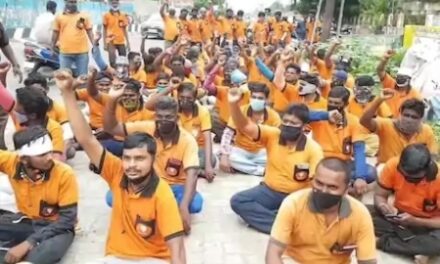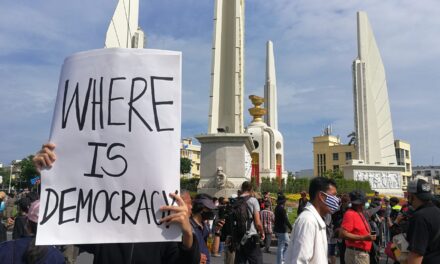Organized by an International Network Against Foreign Military Bases and the Campaign for the Demilitarization of the Americas (CADA)
Informational Session: LESSONS LEARNED FROM THE ANTI-BASES AND ANTI-MILITARIZATION STRUGGLES
27 January 2005
12:00 PM to 3 PM
Strategy Session Tent (F207)
Strategy Session: VISIONS FOR A GLOBAL MOVEMENT AGAINST BASES AND MILITARIZATION
27 January 2005
3:30 PM to 6:30 PM
Strategy Session Tent (F207)
Key Anti-War Movement Events:
Anti-War Strategy Session: Jan 29, 12 PM to 6:30 PM, Strategy Session Tent (F207)
Anti-War Merging Assembly: Jan 30, 8:30 AM to 11 AM, G901SCHEDULE:
Jan 27, 12 PM to 3 PM : Informational Session | Strategy Session Tent (F207)
Jan 27, 3:30 PM to 6:30 PM : Strategy Session | Strategy Session Tent (F207)
Jan 27, 7 PM to 9 PM: Meeting for Inaugural Conference | G101
Jan 31, 4:30 PM to 6:30 PM: Coordination Meeting | Strategy Session Tent (F207)
PROGRAM
The invasion of Iraq and the growing militarization of US foreign policy have highlighted the existence, the breadth, and the purposes of a global network of foreign military bases and other forms of military presence. For decades, there have been diverse and broad local and national struggles against these bases. Over the past two years, there has been a renewed attempt to bring together these struggles in a global campaign. An international network of communities, activists, social movements, NGOs, environmentalists, women's and youth organizations working on the issue has been emerging. At last year's World Social Forum in Mumbai, over 125 participants from 34 countries agreed on an initial set of objectives and plans for this network. The following events at the World Social Forum aim to further expand and deepen links among anti-bases activists and campaigners and lay the ground for activating a global movement against military bases and militarization.
1.) Informational Session:LESSONS LEARNED FROM THE ANTI-BASES AND ANTI-MILITARIZATION STRUGGLES
27 January 2005
12:00 PM to 3 PM
Strategy Session Tent
The hosting of foreign military presence by and other forms of military assistance to a country usually comes at the cost of sovereignty, democracy, and other environmental and social costs. Because of this, foreign military presence generates organized resistance among the people made to the bear such costs. The opposition to foreign military presence usually employs different tactics and strategies depending on the local context and the objectives of each campaign.
In the rich history of resistance to foreign military presence and foreign military assistance, what specific tactics and strategies succeeded and which ones failed? What accounts for these victories and defeats? What are the requirements for a successful local campaign? How have the United States and other foreign militaries responded to such strategies and how can they be countered? In what areas are local campaigns weakest and how can they be strengthened? When does political lobbying work and to what extent should it be relied on? What are the most effective ways to raise people's awareness of the issues? What are the best ways to make the issues relevant to people¹s lives? What are the effective strategies for building and mobilizing the constituency against foreign military presence? What are the best ways to link the issues of militarization with the other struggles? What lessons can be learned from the comparative experiences of various struggles around the world?
2.) Strategy Session: VISIONS FOR A GLOBAL MOVEMENT AGAINST BASES AND MILITARIZATION
27 January 2005
3:30 PM to 6:30 PM
Strategy Session Tent
Various groups from around the world have put in motion the process for building a truly global movement against bases and militarization. How should this process proceed? And what should its final goals be? How do people envision the aims and functions of an international network against bases and militarization? What are people's expectations from this network? How can it contribute to local campaigns and what can local campaigns contribute to it? What should and shouldn¹t it seek to accomplish? What should be its bases of unity? How should it relate with the broader movements against corporate-led globalization, militarization, and imperialism? What lessons can be learned from previous efforts to form international networks around single issues? To what extent should the network be 'structured' and institutionalized without undermining autonomy and democracy in the network? How can this network broaden its base, build its capacity, and mobilize resources? How can it move forward? What urgent actions should it undertake?
3.) Planning Meeting: TOWARDS AN INAUGURAL CONFERENCE
27 January 2005
7:30 PM to 9:30 PM
G101
While the basic requirements for an effective network on foreign military bases are now present, this network still needs to expand by reaching out to more organisations working against foreign military presence; to reach a consensus on this network¹s bases of unity and common objectives; to clarify and sharpen understanding of the network¹s role in global and local struggles; to develop how the broader network can support local and national campaigns against military bases; to come up with priorities and a common plan of action for concrete campaigns and projects; and to reach agreements on organizational arrangements for facilitating communication, coordination, and decision-making. Such tasks can be accomplished by, and in the process of, organizing an inaugural conference for founding the network.
An international organizing committee (IOC) is currently preparing and organizing this conference, tentatively scheduled for the second half of 2005. Among the most immediate tasks for this committee are to set the date and select the venue of the conference; establish a process for identifying, reaching out to and mobilizing anti-bases groups around the world, especially local grassroots campaigns; fund-raise and mobilize resources for the event; and undertake all the necessary logistical preparations for the conference. This planning meeting at the WSF will provide the IOC and other interested parties the opportunity to discuss these tasks in detail and to lay out the broad directions of the process.
4.) Coordination Meeting
BUILDING THE FOUNDATIONS OF EFFECTIVE COORDINATION
31 January 2005
4:30 to 6:30 PM
Strategy Session Tent
This meeting will be for developing and strengthening coordination within the network. It will be for discussing practical questions and coming to agreement on urgent concrete projects that should have been identified during the preceding strategy session. Some of these items include the next steps for the inaugural conference, translation, the map of bases and resistance project, the anti-military bases website, a possible international delegation to a key struggle, list-serve management, bibliography of materials on military bases, campaign materials, etc.
ANTI-BASES PROMOTIONAL CAMPAIGN
The WSF will also be a very useful opportunity for informing more people about, and building support for, the international anti-bases and anti-militarization network. To reach out to more anti-bases/anti-militarization campaigners and organizations the following promotion efforts will be undertaken:
– production of the global map of foreign US military bases
– production of the network¹s flyers and pamphlets
– distribution of maps and flyers in various anti-war/anti-militarization events in the WSF
– announcements about the network during the said anti-war events
– a photo exhibit on anti-bases campaigns
*** VERY IMPORTANT: Please note that, since our events had been categorized as "strategy sessions," information about them will NOT appear in the official WSF program. The one that will appear in the program, entitled "US Bases education and strategy session" was the workshop initially reserved by Focus (just to make sure we have space) but which we have since moved to the
above time-slots and venues. We will be using the space for that Focus-reserved session, G101, for the meeting for the inaugural conference of the anti-bases network instead. Please make sure to inform your networks or other people you think should be attending the informational and strategy sessions about these important changes. ****
YOU TOO CAN JOIN US WITHOUT BEING IN PORTO ALEGRE:
Just e-mail us your thoughts on and ideas about the issues and proposals that will be discussed in the WSF and we will circulate them among the participants gathered at the anti-bases events in the WSF. The program below explains the proposed agenda items for each of the sessions and meetings.
SOLIDARITY TENT
Space has been reserved at the WSF SOLIDARITY TENT for sharing of campaign materials, photo exhibitions, screenings of video presentations, etc.
OTHER ANTI-WAR EVENTS AT THE WSF
The anti-bases movement is an integral part of the broader anti-war movement. We'd like to strongly recommend that we also attend the ff, among
others:
– Anti-War Strategy Session: Jan 29, 12 PM to 6:30 PM, Strategy Session Tent
– Anti-War Merging Assembly: Jan 30, 8:30 AM to 11 AM, G901
FOR MORE INFORMATION, OR TO SEND YOUR INPUTS
Please call or email Herbert Docena [[email protected]; +55 51 81627230
(mobile number in Porto Alegre)] or Diego Azzi [[email protected]; +55 51
81616340).








